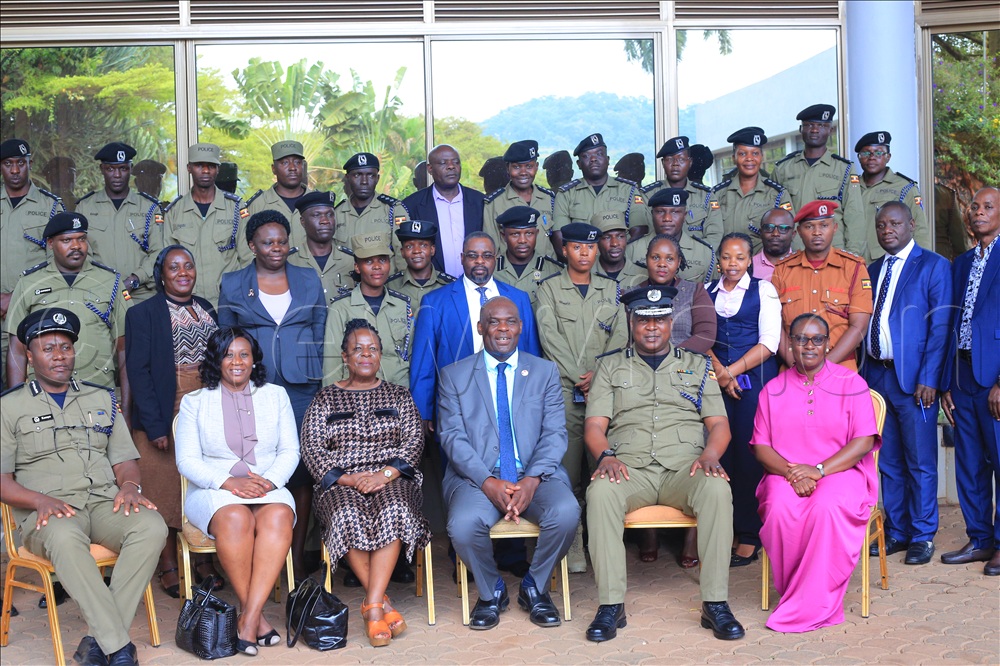Justice Chibita calls for stronger protections for vulnerable groups
In his keynote address, Justice Chibita emphasised the importance of addressing the needs of vulnerable groups, including persons with disabilities, children, the elderly, and refugees.
Justice Mike Chibita, the Supreme Court Judge stressed that justice systems must be accessible, inclusive, and responsive, particularly to the needs of these often-marginalised populations. (Photos by Eric Yiga)
________________
Justice Mike Chibita, the Supreme Court Judge, has called for strengthened collaboration among justice actors to better protect human rights and the welfare of vulnerable groups across the region.
He made the remarks on Monday (September 22) while officially opening a five-day capacity-building workshop hosted by the International Conference on the Great Lakes Region (ICGLR) Regional Training Facility (RTF) in Kampala.
The workshop brings together key stakeholders from the judiciary, police, military, civil society, media, and medical sectors, with the shared goal of enhancing response mechanisms to human rights violations and sexual and gender-based violence (SGBV).
In his keynote address, Justice Chibita emphasised the importance of addressing the needs of vulnerable groups, including persons with disabilities, children, the elderly, and refugees.
“The disabled, those with sight, hearing, and mobility impairments, the elderly, children, and refugees are all part of the vulnerable groups we must prioritise. Uganda, as a refugee-receiving country, hosts persons displaced from countries like Sudan, Congo, Rwanda, Burundi, Somalia, and Eritrea. These individuals deserve dignity, protection, and access to justice,” he said.
Justice Chibita stressed that justice systems must be accessible, inclusive, and responsive, particularly to the needs of these often-marginalised populations.

The ICGLR Regional Training Facility was established by 12 member states under Article 6 of the ICGLR Protocol on the Prevention and Suppression of Sexual Violence Against Women and Children.
It serves as the implementation arm of ICGLR’s judicial cooperation commitments under Article 7 of the same Protocol, focusing on extradition, investigation, and prosecution of SGBV-related cases.
The Facility’s training programmes target judicial officers, prosecutors, police, military personnel, medical staff, and civil society actors to enhance their capacities in handling complex cases of sexual and gender-based violence.
This particular training aims to deepen participants’ understanding of human rights issues within their legal and social contexts, equip them with skills to fast-track the handling of increasing human rights violations, share effective practices and strategies for managing human rights-related cases, and foster joint coordination among stakeholders in prosecution, investigation, adjudication, civil society, and media.
Justice Chibita emphasised that the justice system must evolve from punitive measures to holistic, rehabilitative, and human rights-based approaches.
“We must ask: once someone is convicted, what next? How are they rehabilitated? Our response must reduce recidivism and respect human dignity throughout the justice process,” he noted.
Speaking on behalf of the ICGLR regional director, Dora Byamukama highlighted the importance of chain-linked collaboration among security agencies and justice actors.
“If police officers do not work closely with prosecutors, their efforts may not result in successful prosecutions,” she said. “Even civil society and the media must be integrated into these processes to ensure accountability and transparency.”
Byamukama called for the enforcement and dissemination of critical legal frameworks such as the Human Rights Enforcement Act, the Anti-Torture Act, and the Refugees Act (2006). She noted that while these laws exist, public awareness and proper implementation remain a challenge.
“We must remember, suspects are innocent until proven guilty. No one, especially women and vulnerable individuals, should be treated inhumanely, whether during elections or law enforcement operations,” she warned.
Representing the Uganda Police Force, AIGP Moses Kafeero, director of human resource development and training, reaffirmed the institution’s commitment to mainstreaming human rights in policing.
“This training programme will strengthen departments across the justice sector and ensure that human rights principles are embedded in all operations,” he stated.
Dr John Kamya, the senior commissioner of police in charge of curriculum and doctrine development, echoed this commitment, saying the training is structured to ensure sustainable practices that uphold dignity and justice.
The ICGLR Regional Training Facility continues to play a pivotal role in advancing the Pact on Security, Stability and Development in the Great Lakes Region. With the support of its 12 member states, the Facility is building a network of trained professionals equipped to combat human rights violations and ensure justice for all, especially the most vulnerable.
As the workshop continues throughout the week, participants are expected to draft an advocacy document aimed at legal reform, improving case management systems, and enhancing inter-agency coordination in tackling human rights and SGBV cases.
Justice Chibita concluded his remarks by urging participants to share their field experiences, challenges, and solutions, and to use the platform as a springboard for lasting change.
“This is not just about laws, it’s about people. Let us ensure that justice is not only done but is seen and felt by those who need it most.”